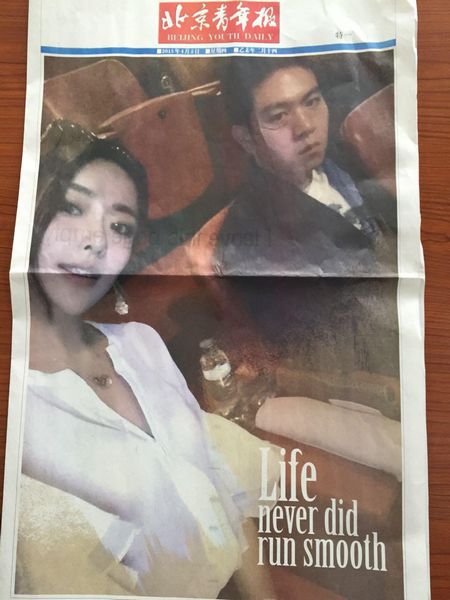Man apologizes to girlfriend in newspaper ad
- By Ma Yujia
 0 Comment(s)
0 Comment(s) Print
Print E-mail China.org.cn, April 3, 2015
E-mail China.org.cn, April 3, 2015
The Beijing-based Beijing Youth Daily attracted much attention yesterday when it used four pages to publish a letter of apology written by an anonymous young man.
 |
|
A rich man splashed US$96,695 on a four-page newspaper advertisement to say sorry to his girlfriend. |
A source close to the newspaper said it cost almost 600,000 yuan (US$96,695) to purchase the special pages. April 2 marked the three-month anniversary of the last time the young man saw his girlfriend, who his representative claimed was being prevented from making contact with him.
However, insiders believed it might be an advertising stunt. Some details of the activity indicated it probably was an advertisement for a mobile APP offering digital postcards.
The first page was covered by a photograph of the man and his beautiful, well-dressed girlfriend, delivering a sweetheart message. The second and the third page were almost blank, except for one sentence, "I leave this page empty, because I suddenly don't know what to write anymore."
The true apology letter in typical postcard-way eventually came to the end on the fourth page with the statement: "Dear Xuan, It is an ordinary day, but meaningful to us somehow. I am sorry that I have been hurting you so much, which really comes back to myself finally. I just want you to know that how important you have been to me and how sorry I am still feeling to you. Your love can do so many others can't, very special and unique. Scott Xu from your left wrist."
It is obvious that no matter whether it is a true apology letter or not, the move has already captured widespread attention and discussion among Internet users, so it can be deemed a huge success. It is to some extent a good try to make full use of integration of the traditional media, like a newspaper, and Internet-based new media.
As the line from an editorial talking about the values of traditional media indicates: "There must be reasonable points that make traditional media survive for several years in the midst of emerging new media. The important thing is whether we know their value and how to make full use of them."
Putting those benefits aside, however, there is also a downside.
China's advertisement law clearly regulates that all types of advertisements should not include false contents, not anything that can be construed as cheating and misleading to consumers. However, the boundary between the law and the innovative ideas need to be clarified further.
Whether the act of purchasing advertising space for marketing purpose violates the law, raises issues of press ethics, or is, as some suspect, violating the citizen's privacy will be discussed carefully in the coming days.





